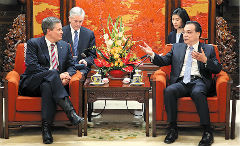China ready to defend its interests
2018-05-11
China Daily
China will resolutely defend its interests even as it expects a positive outcome from the upcoming China-US trade talks through efforts from both sides, the Ministry of Commerce said on May 10.
The ministry issued the statement ahead of a planned hearing on May 15 by the Office of the US Trade Representative to discuss proposed 25 percent tariffs on $50 billion in Chinese imports.
During the hearing, US companies and consumers will have the chance to have certain products taken off the list or others added through public discussion and lobbying.
Regarding this issue of China-US trade friction, China’s stance has been very clear. China opposes any form of unilateralism and protectionism in trading. The US must withdraw its threats, said Gao Feng, spokesman for the Ministry of Commerce.
As China and the US will conduct the second high-level economic and trade consultations in the US soon, Gao said China hopes the two sides can work together to jointly advance bilateral business ties and gain mutual benefit for the good of the people in both countries and the world as a whole.
The Ministry of Commerce also announced on May 9 that Vice-Premier Liu He will lead a delegation to the US to discuss economic and trade issues at an appropriate time, marking the second high-level meeting since a bilateral trade dispute escalated in March. The first talks were in Beijing on May 3 and 4.
Tu Xinquan, director of the China Institute for WTO Studies at the University of International Business and Economics in Beijing, said the Chinese delegation’s visit will be helpful to tell the US public that unilaterally imposing a tariff on China will generate a huge impact on the US economy.
“This will send a signal to companies or people attending the hearing that proposed tariffs will penalize US consumers by increasing prices on consumer and technology products,” he said. “Both sides definitely will discuss the details on this issue in the US.”
The administration of US President Donald Trump escalated trade tensions with China in late March by invoking Section 301 of the US Trade Act of 1974 to probe China’s intellectual property and technology transfer.
A tariff list was issued targeting 1,300 Chinese products, including industrial robots and telecommunications equipment.
Business leaders in the US have voiced concerns about the negative impact of a possible worsening China-US trade relationship and pinned high hopes on the resumed talks between the two countries.
William Cohen, US defense secretary from 1997 to 2001 and now chief executive of the Cohen Group, said there were legitimate concerns to be addressed, but he emphasized that it’s important to address them in a responsible fashion so that everyone is in a win-win situation.
“I don’t feel the (Trump) administration has a strategy for achieving that,” Cohen said. “The stated objective of doing it within the next two years is pretty short term. I don’t think it’s possible.”
According to US media reports, the US trade delegation that Treasury Secretary Steven Mnuchin led to Beijing last week demanded China cut the bilateral deficit by $100 billion a year over the next two years, a demand that most economists regard as untenable because US fiscal policy and low savings rates in the US are the primary cause of the deficit.


